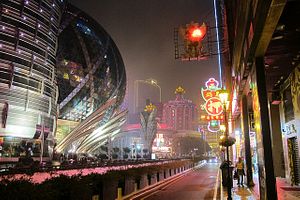Twenty years ago this week, a tiny territory just over 30 square kilometers in size and with a population of little more than half a million, which happens to be the world’s gambling center, was handed over to China. Macau, a Portuguese colony since 1557, is now talked of by the Chinese Communist Party as Asia’s next financial hub.
Macau, as it approaches the twentieth anniversary of its handover, is seen by Xi Jinping’s regime as a role model – and a “good student” – for its interpretation of the “one country, two systems” model. That’s because it sticks to what Beijing wants it to do – make money, through legal or illicit means, and avoid criticizing the regime. In so doing, it epitomizes the Chinese Communist Party’s will. Thirteen years ago Macau surpassed Las Vegas to become the world’s largest gambling den. Now it is becoming the lurid front-window of a sordid, corrupt, and brutal regime in Beijing.
Macau was handed to China on the same principle upon which Hong Kong’s handover was based – “one country, two systems.” But in recent years that principle in both cities has been increasingly eroded. In Macau, pro-Hong Kong demonstrations throughout this year have been banned, and there has been an enormous rise in security regulations, surveillance technology including facial recognition cameras, and the blocking of dissidents, lawyers, activists and academics from visiting Macau. Compounding the tragedy, according to Jason Chao, a prominent Macau human rights activist who has been arrested three times, “the Macau government has stepped up its efforts to silence any sprout of dissent.”
Macau, a city where I used to visit refugees, has become a city that refuses entry to controversial international visitors, most recently the president of Hong Kong’s American Chamber of Commerce. And a city which I used to visit occasionally for respite from the helter-skelter of busy Hong Kong has now become a danger-zone for critics of China.
Just this week a senior South China Morning Post reporter, Phila Siu, was detained and questioned for three hours before being sent back to Hong Kong. He was required to provide his personal details including his address. He was only going to cover Xi Jinping’s visit to the city, and had official press accreditation from the Macau government. A reporter from Hong Kong’s Now TV News was also refused entry on Monday at the new checkpoint manned by mainland Chinese officials on the Hong Kong-Zhuhai-Macau Bridge. Another Hong Kong man, who went missing on the bridge last week, turns out to have been arrested by the Chinese authorities for a crime he allegedly committed in 2012.
The world is rightly focused on the erosion of freedom in Hong Kong. But it should not ignore Macau, where freedom is eroding more quickly, more silently, more invisibly, and with less resistance. As we mark the 20th anniversary of Macau’s handover, let us turn our thoughts to the cause of freedom for both these cities – and for the people of China as a whole living under an increasingly brutal regime.
Benedict Rogers is the founder and chair of Hong Kong Watch.

































